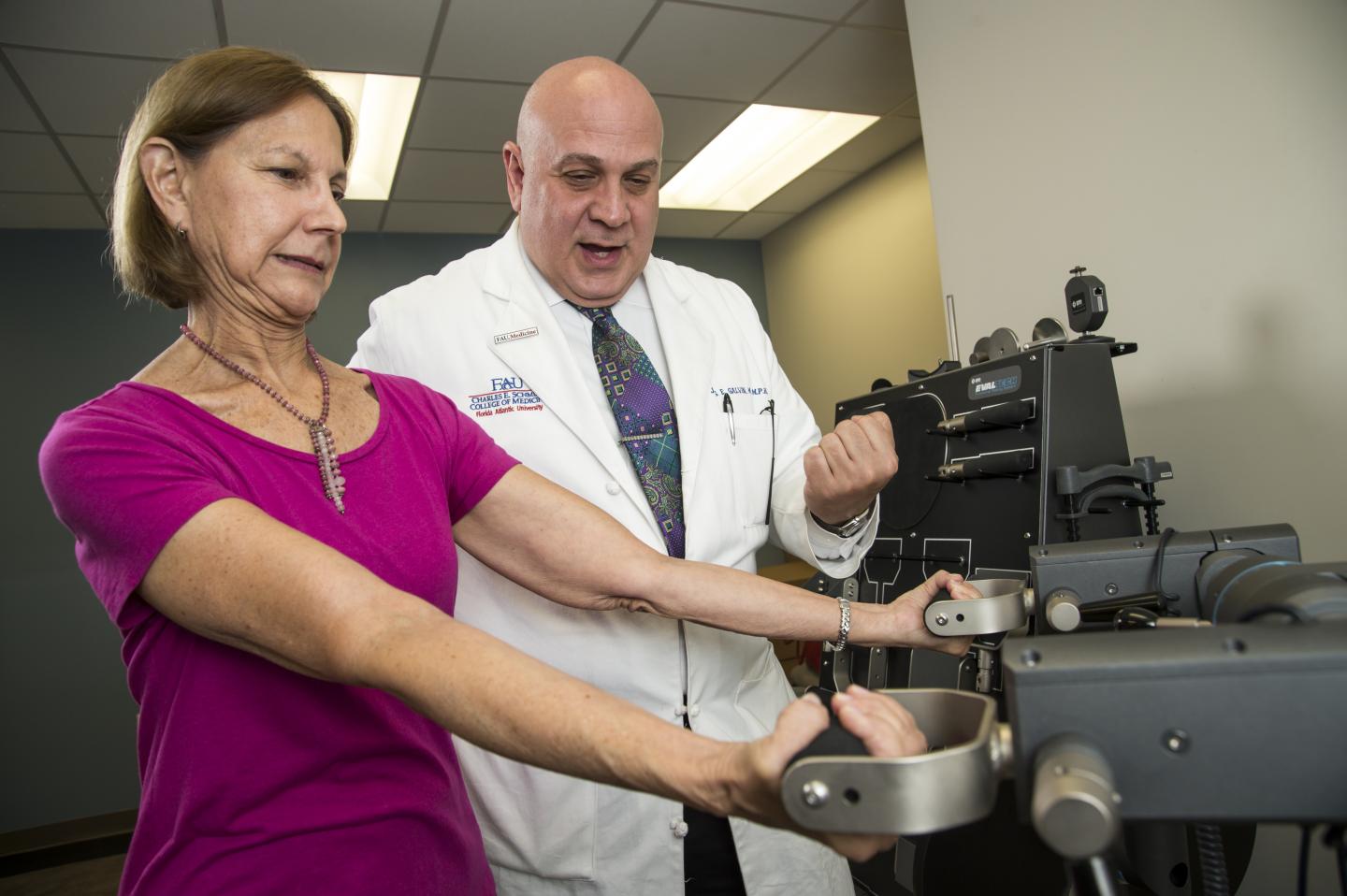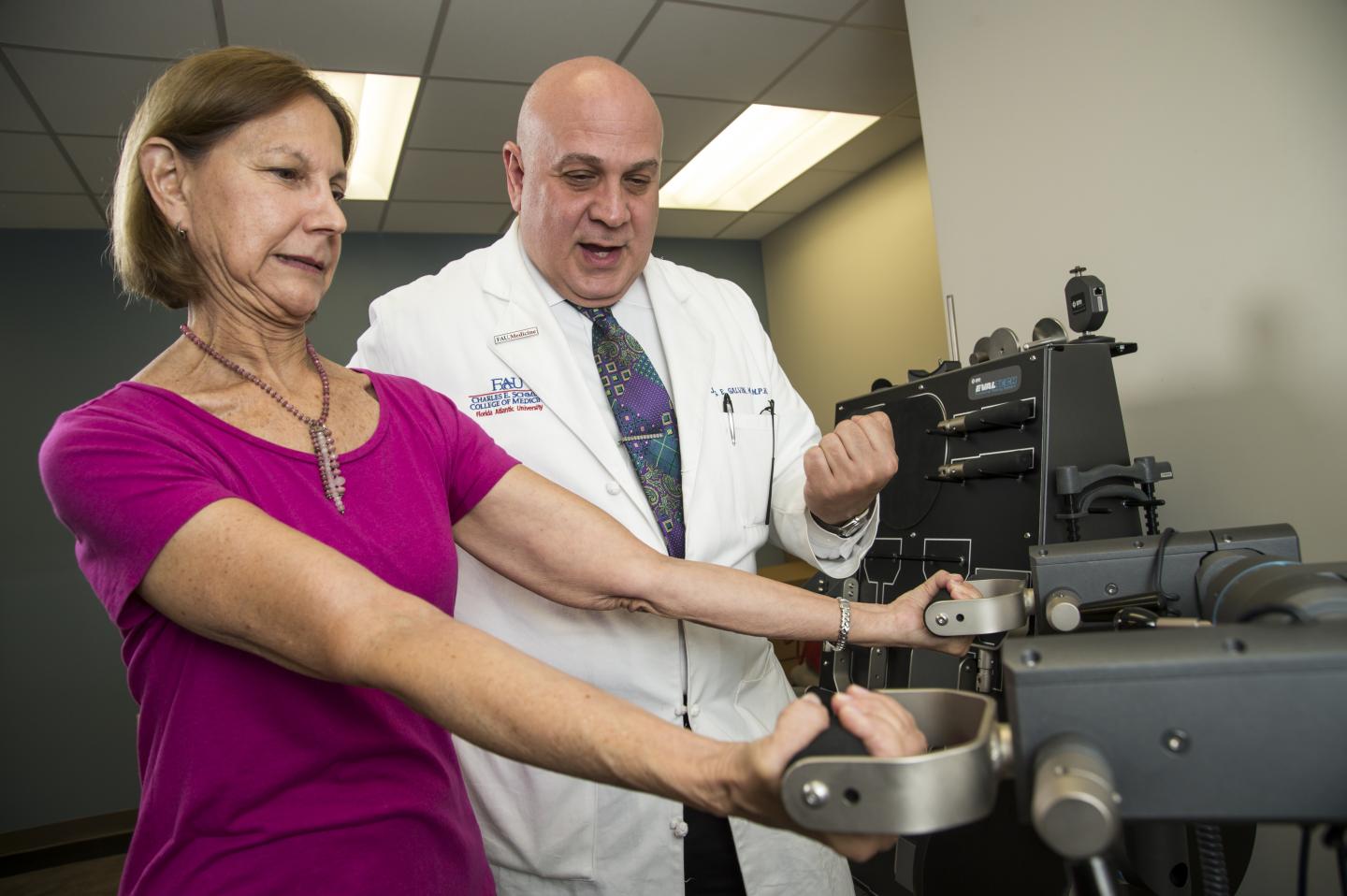
Credit: Florida Atlantic University
A new study has found that "skinny fat" – the combination of low muscle mass and strength in the context of high fat mass – may be an important predictor of cognitive performance in older adults. While sarcopenia, the loss of muscle tissue that is part of the natural aging process, as well as obesity both negatively impact overall health and cognitive function, their coexistence poses an even higher threat, surpassing their individual effects.
The study, published in the journal Clinical Interventions in Aging, was led by researchers at Florida Atlantic University's Comprehensive Center for Brain Health in the Charles E. Schmidt College of Medicine.
Using data from a series of community-based aging and memory studies of 353 participants, the researchers assessed the relationship of sarcopenic obesity or skinny fat with performance on various cognition tests. The average age of the participants was 69. Data included a clinic visit, valid cognitive testing such as the Montreal Cognitive Assessment and animal naming; functional testing such as grip strength and chair stands; and body composition (muscle mass, body mass index, percent of body fat) measurements.
Results from the study show that sarcopenic obesity or "skinny fat" was associated with the lowest performance on global cognition, followed by sarcopenia alone and then obesity alone. Obesity and sarcopenia were associated with lower executive function such as working memory, mental flexibility, self-control and orientation when assessed independently and even more so when they occurred together.
Using a cross-sectional design, the researchers found consistent evidence to link sarcopenic obesity to poor global cognitive performance in the study subjects. This effect is best captured by its sarcopenic component with obesity likely having an additive effect. This effect extends to specific cognitive skills, in particular executive function.
"Sarcopenia has been linked to global cognitive impairment and dysfunction in specific cognitive skills including memory, speed, and executive functions," said senior author James E. Galvin, M.D., M.P.H., one of the most prominent neuroscientists in the country, associate dean for clinical research and a professor of integrated medical science in FAU's Schmidt College of Medicine, and a professor in FAU's Christine E. Lynn College of Nursing. "Understanding the mechanisms through which this syndrome may affect cognition is important as it may inform efforts to prevent cognitive decline in later life by targeting at-risk groups with an imbalance between lean and fat mass. They may benefit from programs addressing loss of cognitive function by maintaining and improving strength and preventing obesity."
Obesity may contribute to the risk of impaired executive function through vascular, behavioral, metabolic, and inflammatory mechanisms or can result from reduced impulse control, self-monitoring, and goal-directed behavior in individuals with impaired executive function with a negative effect on the ability to maintain energy balance. The exact mechanisms linking obesity to cognitive dysfunction are yet to be determined, although several pathways including sedentary behavior, inflammation, and vascular damage have been proposed. Sarcopenia, in turn, has been linked to impairments in abilities that relate to conflict resolution and selective attention. Executive function is reduced in obese older adults, and improvement in muscular function has been linked to enhancement of executive function in senior adults.
Galvin and his study collaborators, Magdalena I. Tolea, Ph.D., a research assistant professor of integrated medical science, and Stephanie Chrisphonte, M.D., a research assistant professor of integrated medical science, both in FAU's Schmidt College of Medicine, caution that changes in body composition including a shift toward higher fat mass and decreased lean muscle mass represent a significant public health concern among older adults as they may lead to various negative health outcomes including cardiovascular and neurodegenerative diseases.
"Sarcopenia either alone or in the presence of obesity, can be used in clinical practice to estimate potential risk of cognitive impairment," said Tolea. "Testing grip strength by dynamometry can be easily administered within the time constraints of a clinic visit, and body mass index is usually collected as part of annual wellness visits."
###
This study was supported by grants from the National Institute on Aging of the National Institutes of Health (R01 AG040211 and P30 AG008051), the Morris and Alma Schapiro Fund and the New York State Department of Health.
About the Charles E. Schmidt College of Medicine:
FAU's Charles E. Schmidt College of Medicine is one of approximately 151 accredited medical schools in the U.S. The college was launched in 2010, when the Florida Board of Governors made a landmark decision authorizing FAU to award the M.D. degree. After receiving approval from the Florida legislature and the governor, it became the 134th allopathic medical school in North America. With more than 70 full and part-time faculty and more than 1,300 affiliate faculty, the college matriculates 64 medical students each year and has been nationally recognized for its innovative curriculum. To further FAU's commitment to increase much needed medical residency positions in Palm Beach County and to ensure that the region will continue to have an adequate and well-trained physician workforce, the FAU Charles E. Schmidt College of Medicine Consortium for Graduate Medical Education (GME) was formed in fall 2011 with five leading hospitals in Palm Beach County. In June 2014, FAU's College of Medicine welcomed its inaugural class of 36 residents in its first University-sponsored residency in internal medicine and graduated its first class of internal medicine residents in 2017.
About Florida Atlantic University:
Florida Atlantic University, established in 1961, officially opened its doors in 1964 as the fifth public university in Florida. Today, the University, with an annual economic impact of $6.3 billion, serves more than 30,000 undergraduate and graduate students at sites throughout its six-county service region in southeast Florida. FAU's world-class teaching and research faculty serves students through 10 colleges: the Dorothy F. Schmidt College of Arts and Letters, the College of Business, the College for Design and Social Inquiry, the College of Education, the College of Engineering and Computer Science, the Graduate College, the Harriet L. Wilkes Honors College, the Charles E. Schmidt College of Medicine, the Christine E. Lynn College of Nursing and the Charles E. Schmidt College of Science. FAU is ranked as a High Research Activity institution by the Carnegie Foundation for the Advancement of Teaching. The University is placing special focus on the rapid development of critical areas that form the basis of its strategic plan: Healthy aging, biotech, coastal and marine issues, neuroscience, regenerative medicine, informatics, lifespan and the environment. These areas provide opportunities for faculty and students to build upon FAU's existing strengths in research and scholarship. For more information, visit http://www.fau.edu.
Media Contact
Gisele Galoustian
[email protected]
561-297-2676
http://www.fau.edu





